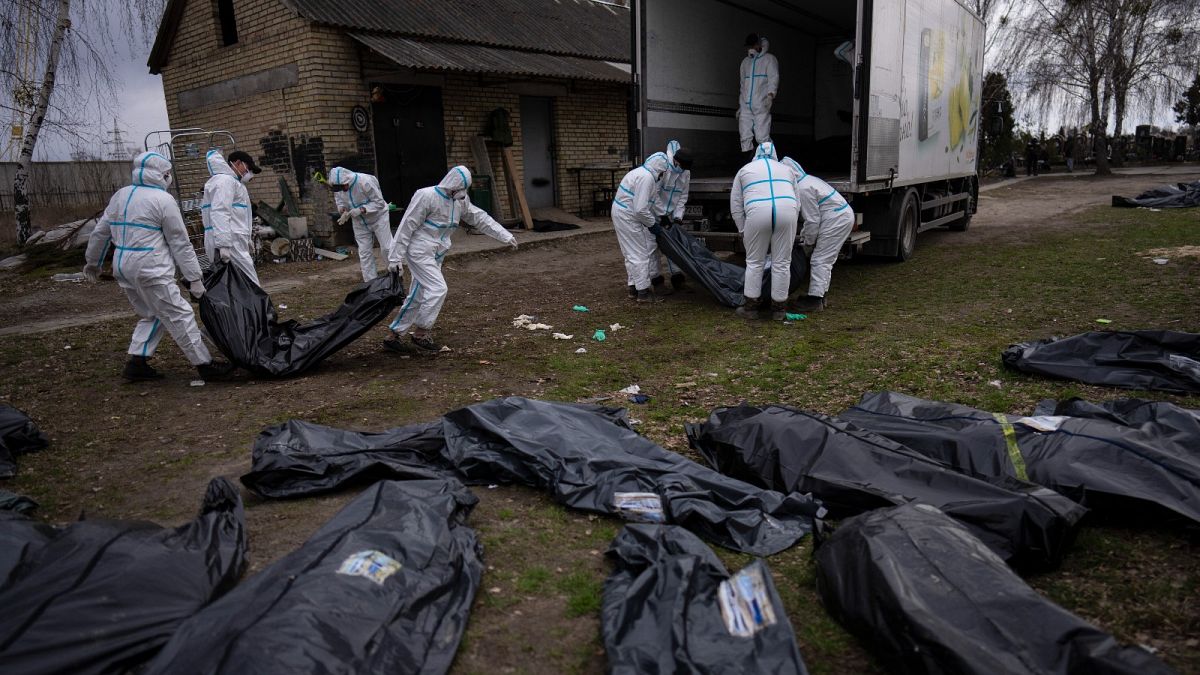Political, diplomatic and judicial leaders from around 40 nations gathered in The Hague on Thursday for a conference on accountability for crimes committed in Ukraine since the Russian invasion.
Ukrainian President Volodymyr Zelenskyy on Thursday called for a "special tribunal" to investigate the Russian invasion, addressing an international conference on war crimes in Ukraine in The Hague.
"The current judicial institutions cannot bring all the perpetrators to justice. Therefore, a special court is needed to try the crimes of Russian aggression against Ukraine," Zelenskyy said in a video broadcast at the conference.
Political, diplomatic and judicial leaders from around 40 nations gathered in The Hague on Thursday for a conference on accountability for crimes committed in Ukraine since the Russian invasion earlier this year.
Organised by the International Criminal Court (ICC), the European Commission and the Netherlands, the event aimed to ensure that crimes committed since the Russian invasion "do not go unpunished".
The ICC prosecutor Karim Khan opened an investigation into possible war crimes in Ukraine in early March, after receiving the green light from 43 states.
But the court, which has been prosecuting the world's worst atrocities for 20 years, cannot prosecute the crime of aggression if the country has not ratified the Rome Statute, which is the case for Russia and Ukraine.
The question of a special court is therefore "a very valid point", Dutch Foreign Minister Wopke Hoekstra told journalists after the conference. "I think the issue is worth studying."
"So I can imagine that we are considering setting up such a tribunal. The Netherlands will look at this openly," he continued, conceding however that it "will probably not be easy".
Hoekstra, Karim Khan and EU Justice Commissioner Didier Reynders reiterated the need to "work together" to ensure justice is done.
The conference led to several countries paying more money to the ICC for its investigation and sending experts to Ukraine, Hoekstra said.
"We need to be coordinated, to dialogue and communicate" to ensure that international law prevails, "to avoid the scenes from hell that we have seen", Karim Khan told reporters.
Since Russian President Vladimir Putin ordered the invasion of Ukraine on February 24, his military forces have been accused of abuses including killings in the Kyiv suburb of Bucha.
Multiple investigations underway
The meeting comes as investigations already are underway at the national and international levels. Among the topics is how investigators from different countries can collect and document evidence, including of sexual crimes so that it can be used in other jurisdictions.
Some 14 European states are investigating the crimes in Ukraine and a joint European investigation team has been set up. Ukraine has opened thousands of war crimes investigations since hostilities began.
So far, the court has not announced any arrest warrants for suspects in the probe that could reach the very top of Russia's military chain of command, as well as the Kremlin.
The ICC is a court of last resort that opens cases when other countries are unwilling or unable to launch prosecutions. The Hague-based court has no police force to make arrests and relies on assistance from other countries to detain suspects.
Neither Russia nor Ukraine are among the court's 123 member states, but Kyiv has accepted the court's jurisdiction.
Russia systematically denies all the abuses of which its troops are accused: bombing of civilians, summary executions, rape. And it accuses Ukraine of war crimes in return.
Two Russian soldiers were sentenced in May to 11 and a half years in prison by a Ukrainian court for bombing civilian areas, while another was jailed for life earlier this month for the murder of a civilian.
There is no overall death toll for civilians in the conflict. The UN has put the number of confirmed deaths at around 5,000, including more than 300 children, but acknowledges that the true number is likely to be much higher.
Forced deportations a 'war crime', says Blinken
In a statement on Wednesday, US Secretary of State Antony Blinken called on Moscow to halt forced deportations in areas of Ukraine controlled by Russia, saying an estimated 900,000 to 1.6 million Ukrainians have been “interrogated, detained, and forcibly deported” to Russia.
“Moscow’s actions appear premeditated and draw immediate historical comparisons to Russian ‘filtration’ operations in Chechnya and other areas,” Blinken said. “President Putin’s ‘filtration’ operations are separating families, confiscating Ukrainian passports and issuing Russian passports in an apparent effort to change the demographic makeup of parts of Ukraine.”
Blinken said Putin and his government “will not be able to engage in these systematic abuses with impunity. Accountability is imperative. This is why we are supporting Ukrainian and international authorities’ efforts to collect, document, and preserve evidence of atrocities. Together, we are dedicated to holding perpetrators of war crimes and other atrocities accountable.”
